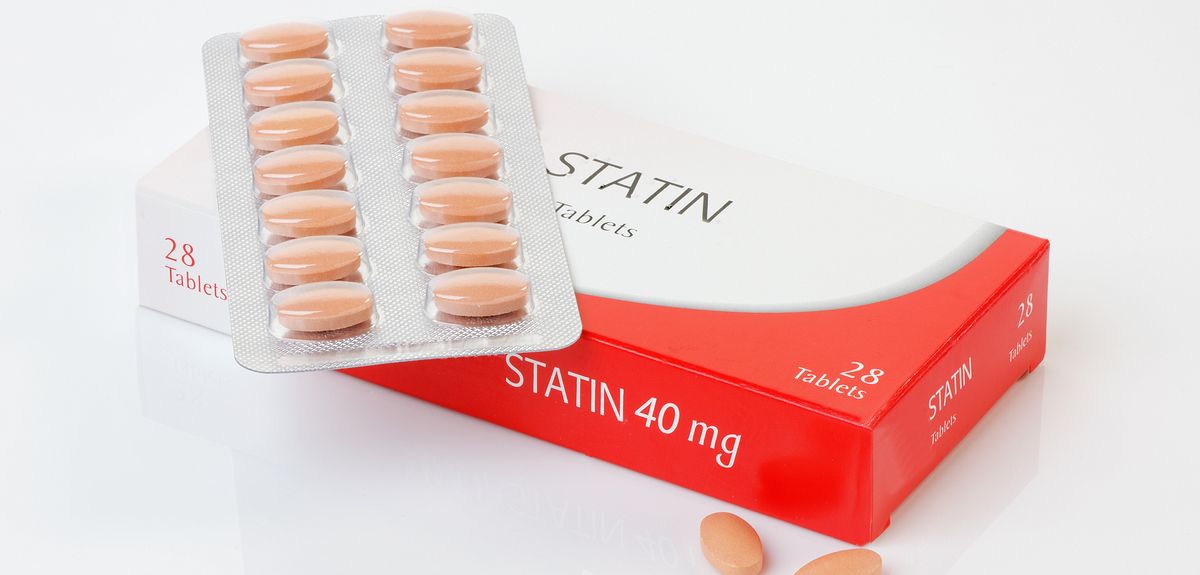
Image credit: roger ashford via Shutterstock
Major review to help doctors, patients and public make informed decisions about using statins
A major review of the available evidence on the safety and efficacy of statin therapy, published in The Lancet, intends to help doctors, patients and the public make informed decisions about the use of the drugs. The authors warn that the benefits of statin therapy have been underestimated, and the harms exaggerated, because of a failure to acknowledge properly both the wealth of evidence from randomised trials and the limitations of other types of studies.
Research on statins has been ongoing for over 30 years, generating a large amount of data from a wide variety of patients. The review published today explains how the available evidence on the efficacy and safety of statin therapy should be interpreted, and concludes that:
Whereas most of the side-effects can be reversed with no residual effects by stopping the statin, the effects of a heart attack or stroke not being prevented are irreversible and can be devastating.
Professor Sir Rory Collins, Nuffield Department of Population Health
Lowering cholesterol by 2 mmol/L with an effective low-cost statin therapy (e.g. atorvastatin 40 mg daily, which costs about £2 per month in the UK) for 5 years in 10,000 patients would:
- Prevent major cardiovascular events (heart attacks, ischaemic strokes and coronary artery bypasses) in 1000 people with pre-existing vascular disease ('secondary prevention'), and in 500 people who are at increased risk (eg, due to their age or having hypertension or diabetes) but have not yet had a vascular event ('primary prevention').
- Cause 5 cases of myopathy (one of which might progress to the more severe condition of rhabdomyolysis, if the statin is not stopped), 5-10 haemorrhagic strokes, 50-100 new cases of diabetes and up to 50-100 cases of symptomatic adverse events (such as muscle pain).
The authors note that although further research may identify small additional beneficial or adverse effects, this is unlikely to materially alter the balance of benefits and harms for patients because of the evidence generated so far.
'Our review shows that the numbers of people who avoid heart attacks and strokes by taking statin therapy are very much larger than the numbers who have side-effects with it. In addition, whereas most of the side-effects can be reversed with no residual effects by stopping the statin, the effects of a heart attack or stroke not being prevented are irreversible and can be devastating. Consequently there is a serious cost to public health from making misleading claims about high side-effect rates that inappropriately dissuade people from taking statin therapy despite the proven benefits,' says review author Professor Rory Collins, Clinical Trial Service Unit (CTSU), University of Oxford, UK.
Professor Liam Smeeth, co-author from the London School of Hygiene & Tropical Medicine, London, UK adds: 'The best available scientific evidence tells us that statins are effective, safe drugs that have a crucial role in helping prevent cardiovascular disease: the leading cause of morbidity and mortality worldwide.'
Randomised trials vs observational studies
The review discusses the strengths and limitations of different types of studies. Randomised controlled trials are a robust and well recognised way of determining the effect of treatments. Whereas observational studies based on databases can generate hypotheses about associations between the use of drugs and health outcomes, randomised trials can determine cause and effect.
In a randomised trial, patients are randomly divided into two or more groups – eg, one group is given a drug and the other group is given a dummy treatment (a 'placebo'). Researchers then compare the rates of health outcomes between these groups. Randomly allocating patients means that any difference in these rates can generally be attributed to the treatment itself. Additionally, by 'blinding' the patients and their doctors as to whether they are taking the drug being studied or a placebo, bias in the assessment of health outcomes between the different treatment groups can be avoided.
Meta-analyses bring together evidence from randomised trials that have tested the same treatment and, by including data from a larger and more diverse set of patients, can increase the reliability and generalisability of the results.
By contrast, observational studies compare the health outcomes of people who have been given a particular treatment by their doctors as part of routine care, and people who have not been given the treatment. Doctors give treatments to selected patients for good reasons, so the health of the patients given a treatment may be very different to the health of people who are not given it. These differences in the underlying risks of the different groups of patients are hard to predict, and it is not possible to know that they have been allowed for completely in the analyses.
In addition, patients prescribed a drug in routine care know that they are getting it, and their doctors may have warned them that the drug may cause problems. Consequently, the patients may be more likely to attribute health outcomes (particularly symptoms that are subjective, eg muscle aching) to the drug, whereas people who are not taking the drug would not do so.
As a result, although observational studies may be able to detect large increases in health outcomes that would usually be rare, they are not able to produce reliable evidence about the effects of drug treatments when the health outcomes are common or the effects are not large.
Benefits of statin therapy
Using an effective statin regimen (such as generic atorvastatin 40mg daily, which costs about £2 per month in the UK) to reduce LDL cholesterol by 2 mmol/L would almost halve a person's risk of a major vascular event.
Evidence from large population studies, combined with studies in animals, genetic research and randomised controlled trials have confirmed a causal link between higher levels of LDL cholesterol in the blood and higher risks of vascular disease.
Meta-analyses of large randomised controlled trials of statin therapy indicate that each 1 mmol/L reduction in LDL cholesterol with statin therapy reduces the risk of coronary deaths and heart attacks, ischaemic strokes (strokes due to blood clots) and coronary revascularisation procedures by about 25% during each year (after the first) that treatment continues to be taken.
The meta-analyses also indicate that larger reductions in LDL cholesterol with statin therapy produce larger reductions in the risks of these major vascular events. For example, using an effective statin regimen (such as generic atorvastatin 40 mg daily, which costs about £2 per month in the UK) to reduce LDL cholesterol by 2 mmol/L would almost halve a person's risk of a major vascular event.
It has been claimed, based on observational studies, that statin therapy might also reduce the risks of cancer and various other conditions (including respiratory diseases and infections, deep vein thrombosis, and post-operative atrial fibrillation). However, the evidence from randomised trials shows that these associations in observational studies do not reflect a causal effect of statin therapy.
Harms of statin therapy
The purpose of this review is to help doctors and patients make informed decisions about the use of this important drug class.
Dr Richard Horton, Editor, The Lancet
Myopathy is a rare condition involving muscle pain, tenderness, or weakness accompanied by significant increases in blood creatine kinase concentrations. Evidence from observational studies and randomised trials points to a causal effect of statin therapy on myopathy. However, the risk of myopathy is low: about 1 extra case per 10,000 patients taking an effective statin regimen (such as atorvastatin 40 mg daily) during each year of treatment.
In addition, evidence from randomised trials has identified an increased risk of diabetes due to statin therapy: about 10-20 extra cases of diabetes developing per 10,000 treated patients per year. This excess of diabetes occurs mainly in people who are already at increased risk of developing diabetes, and its clinical significance is uncertain. In particular, although diabetes is associated with increased risk of vascular disease, statin therapy produces substantial reductions in vascular disease.
Some observational studies have suggested statin therapy may be associated with an increased risk of haemorrhagic stroke. And randomised trials indicate that statin therapy may increase the risk of haemorrhagic stroke by about one-fifth. Typically, in Western populations, this would correspond to an increase of about 5-10 extra cases per 10,000 treated patients per year. In most circumstances, the reductions in ischaemic strokes produced by statin therapy are much bigger than the increases in haemorrhagic strokes, so the risk of stroke of any kind is reduced substantially.
Reports of increased rates of muscle pain and weakness in observational studies have led to claims that as many as 20% of patients have 'statin intolerance', mainly due to muscle pain and weakness. The randomised trial evidence demonstrate that these claims represent misattribution of symptoms to the statin therapy. Instead, at most, statin therapy causes an increase in symptomatic adverse events (such as muscle pain and weakness) in about 10-20 of 10,000 treated patients per year.
It has been claimed, based on observational studies, that statin therapy might increase the risks of various other conditions (including memory loss, cataracts, kidney injury, liver disease, sleep disturbance, aggression, suicidal behavioural, erectile disjunction and neuropathy). However, the evidence from the randomised trials shows that these associations in observational studies do not reflect a causal effect of statin therapy.
Writing in a linked Comment, Dr Richard Horton, editor-in-chief of The Lancet says: 'Controversy over the safety and efficacy of statins has harmed the health of potentially thousands of people in the UK. That is why we are this week publishing a comprehensive scientific review about the efficacy and safety of statin therapy by researchers who have made substantial contributions to the science of statins. The purpose of this review is to help doctors and patients make informed decisions about the use of this important drug class.'
The paper, Interpretation of the evidence for the efficacy and safety of statin therapy, is published in The Lancet.
 New study estimates NHS England spends 3% of its primary and secondary care budget on the health impacts of temperature
New study estimates NHS England spends 3% of its primary and secondary care budget on the health impacts of temperature
 International collaboration launches largest-ever therapeutics trial for patients hospitalised with dengue
International collaboration launches largest-ever therapeutics trial for patients hospitalised with dengue
 Oxford-built multi-agent assistant for cancer care to be piloted in collaboration with Microsoft
Oxford-built multi-agent assistant for cancer care to be piloted in collaboration with Microsoft
 World's first Phase II Nipah virus vaccine trial launch
World's first Phase II Nipah virus vaccine trial launch
 Statin treatment before heart surgery does not prevent heart damage or atrial fibrillation
Statin treatment before heart surgery does not prevent heart damage or atrial fibrillation